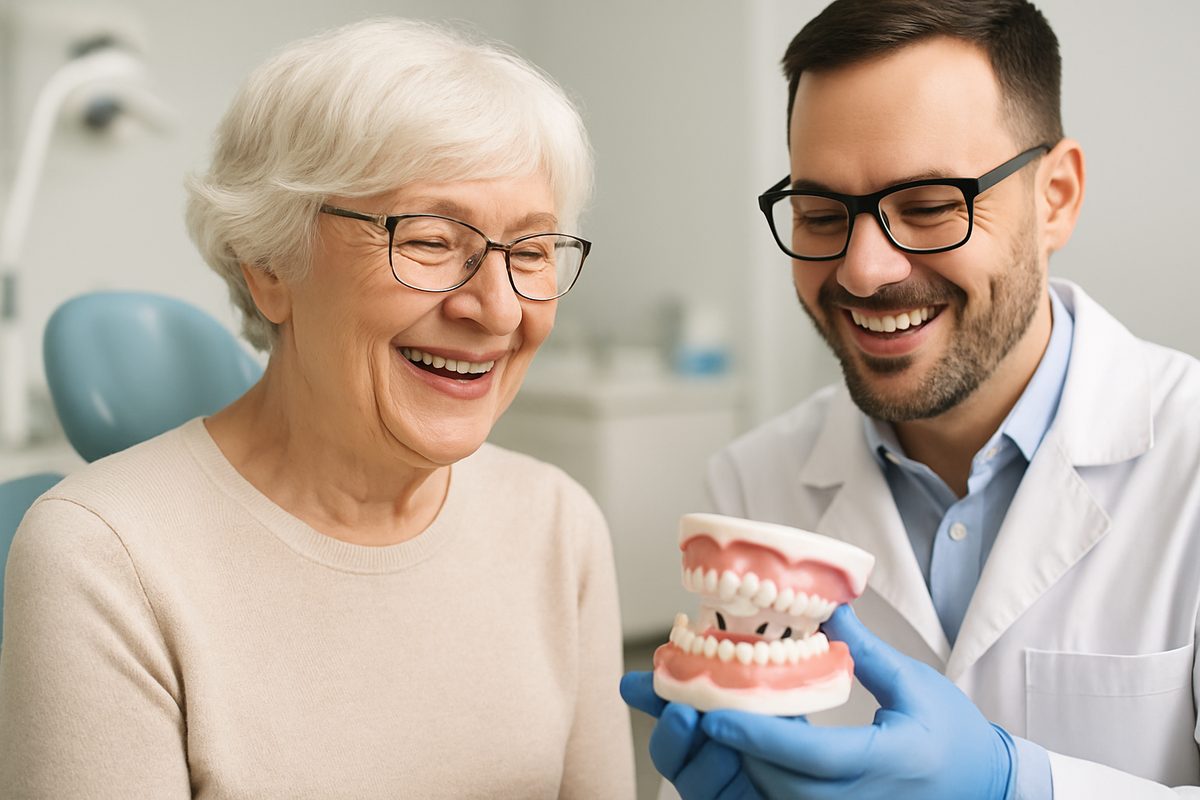Implant supported dentures are a modern way to replace most or all missing teeth. They use dental implants as anchors to hold a denture in place. This makes chewing, speaking, and smiling much easier than with traditional removable dentures. If you’re searching for implant supported dentures aurora co, this guide explains what they are, who is a good candidate, the treatment steps, costs, risks, and how to choose a provider in Aurora, CO.
What Are Implant Supported Dentures in Aurora, CO?
Implant supported dentures attach to dental implants placed in the jaw. Unlike traditional dentures that rest on the gums, implant dentures snap on or screw into implants. This improves stability and comfort. They differ from single-tooth implants, which replace one tooth. Common types include removable implant overdentures that use locator or bar attachments, and fixed full-arch prostheses (often called hybrid or all‑on‑4) that screw onto multiple implants and are not removed daily by the patient.
Key Benefits of Implant Supported Dentures
Improved stability, chewing, and speech
Because implants anchor the denture to bone, patients bite with more force and eat a wider range of foods. The denture won’t slip during talking or laughing. This leads to greater confidence in public and better nutrition.
Bone preservation and facial support
Implants stimulate the jawbone, slowing the bone loss that follows tooth loss. Maintaining bone helps preserve facial shape and prevents the collapsed look common with long-term removable dentures. This can improve how you look and how dentures fit over time.
Comfort and long-term value
Implant supported dentures usually need fewer relines and feel more natural. While the upfront cost is higher than removable dentures, implants often prove more cost-effective over years due to fewer adjustments and better durability.
Who Is a Good Candidate for Implant Supported Dentures in Aurora, CO?
Good candidates are people missing most or all teeth who want a stable solution. Adequate jawbone is important; if bone is thin, grafting or sinus lifts can make implants possible. Controlled medical conditions such as diabetes are usually manageable, but uncontrolled illnesses, heavy smoking, or certain medications can raise risks. A CBCT scan (3D imaging) is commonly used to assess bone and plan implant placement.
Treatment Process: Step‑by‑Step
Consultation and planning
The first visit typically includes an exam, digital intraoral scans, and a CBCT 3D image. Your dentist reviews options (removable overdenture vs fixed hybrid), discusses timelines, and creates a customized plan. Expect questions about medical history and costs.
Surgery and implant placement
Implants are placed surgically, often using guided templates made from digital planning for precise placement. Sedation options range from nitrous oxide to oral or IV sedation. Some cases allow immediate loading (a temporary denture attached the same day); others wait until implants integrate with bone.
Healing, attachments, and final prosthesis
Osseointegration (bone bonding to the implant) takes weeks to months. After healing, attachments are placed—either bars, locator snaps, or screws for a fixed hybrid. Final adjustments ensure fit, bite, and esthetics before delivering the permanent prosthesis.
Same‑day and in‑house lab advantages
Digital workflows and on-site labs speed the process and improve fit. Same-day temporary solutions can restore function immediately, while in-house technicians help with quick adjustments and better color matching.
Recovery, Maintenance, and Longevity
Initial healing usually takes 1–2 weeks for soft tissue, with full osseointegration in 3–6 months for many cases. Follow-up visits check healing and prosthetic fit. Daily cleaning of the prosthesis and implants is essential—this may include brushing, flossing under bars, and special brushes or water picks. Periodic maintenance includes screw checks, replacement of worn attachments, and professional cleanings. With proper care, implants can last decades while prosthetic teeth may need replacement or relining every 5–15 years.
Costs, Insurance, and Financing Options Near Aurora, CO
Costs vary with the number of implants, need for grafts, material (titanium vs zirconia), sedation, and lab work. As a rough guide: removable overdentures supported by 2–4 implants often range from about $7,000–$20,000; fixed full-arch prostheses (all‑on‑4 style) commonly range from $15,000–$35,000 per arch. Insurance may cover parts of treatment like extractions or some prosthetic work but rarely covers full implant costs. Many practices offer financing plans, third‑party lenders, or in-house payment options to spread the expense.
Risks, Complications, and When to Seek Care
Possible complications include infection, implant failure, nerve or sinus complications, and prosthetic wear. Early warning signs include persistent pain, swelling, fever, loose implants, or changes in bite. If you notice these, contact your provider promptly; many issues are treatable if caught early.
Choosing a Provider for Implant Supported Dentures in Aurora, CO
Look for a team with implant experience—prosthodontists or restorative dentists working with oral surgeons. Key capabilities include CBCT imaging, guided surgery, clear treatment plans, and in-house lab support. At a consult, ask who will place the implants, who will design and make the prosthesis, what sedation options are available, and the practice’s success rates and warranty policies.
Why Dental Associates of Colorado for Implant Supported Dentures Near Aurora, CO
Dental Associates of Colorado uses a prosthodontist-led team (Dr. Seung H. Lee) and oral & maxillofacial surgical support (Dr. Jonathan Jundt). They offer CBCT imaging, guided surgery, sedation options (nitrous, oral, IV), and an in-house crown/bridge & denture lab. These capabilities help plan complex cases predictably, provide same-day solutions when appropriate, and allow close clinician‑technician collaboration for better fit and esthetics.
Next Steps: Scheduling a Consultation for Implant Supported Dentures in Aurora, CO
Bring your medical history, list of medications, and any past x-rays to your appointment. A typical timeline runs from consult to final restoration over 3–6 months, shorter with immediate-load options. To learn if implant supported dentures are right for you, request an evaluation to review imaging, costs, and a personalized treatment plan.



